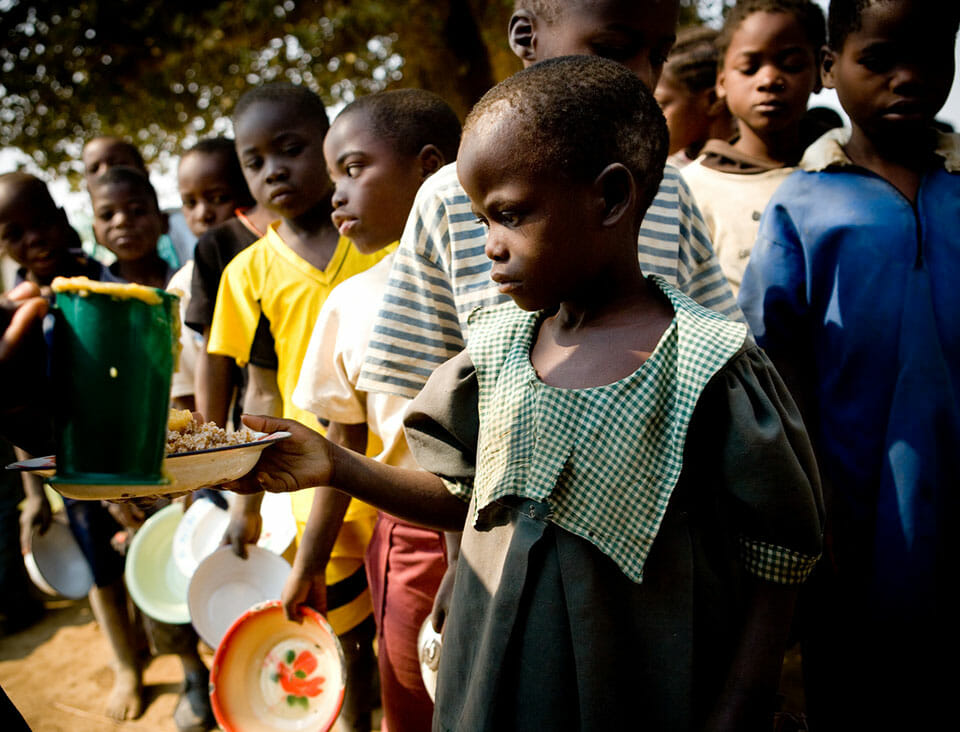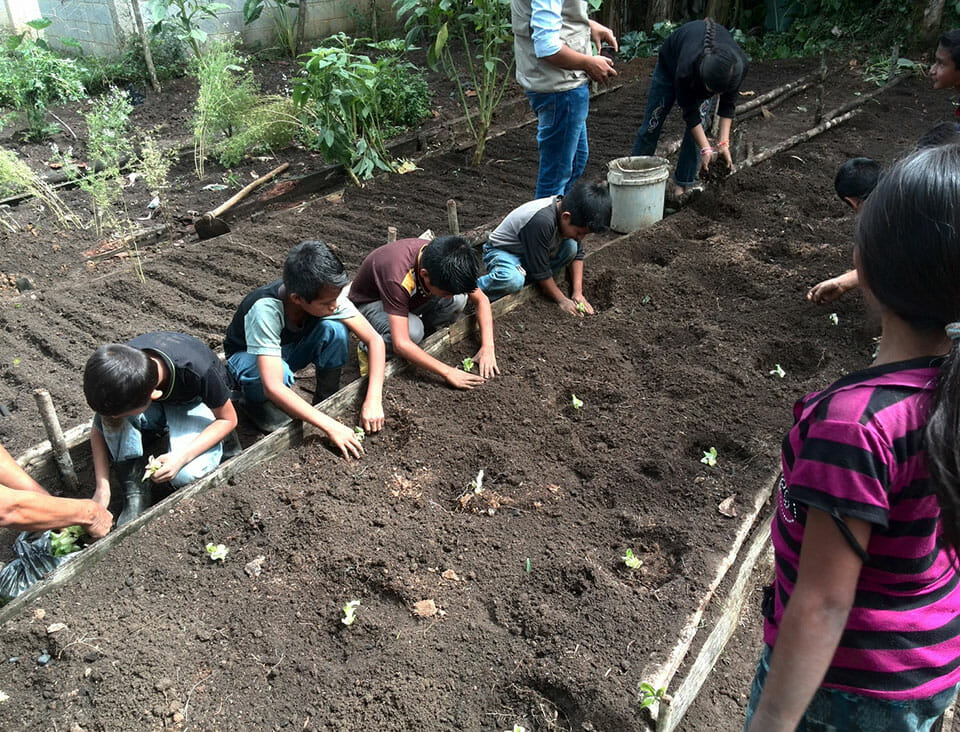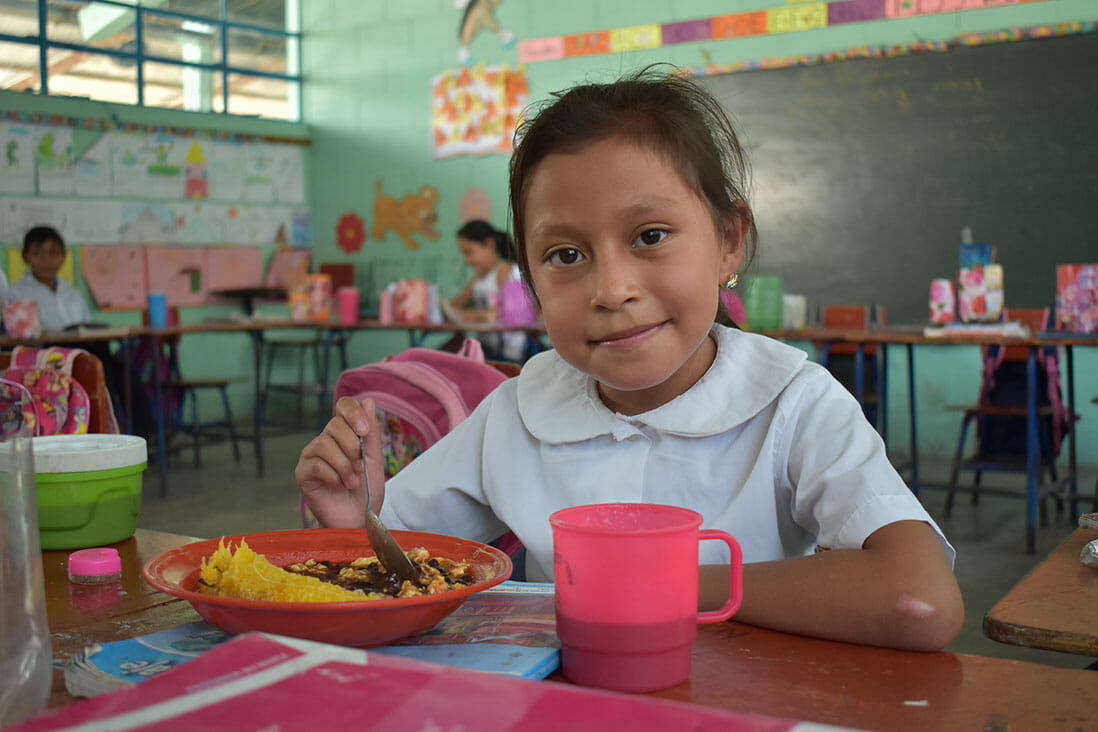Since 2001, Global Communities (formerly PCI) has partnered with the U.S. Department of Agriculture (USDA) to implement 23 integrated school feeding projects – 20 McGovern-Dole International Food for Education and Child Nutrition (McGovern-Dole) and three Local and Regional Food Aid Procurement (LRP) – reaching more than 1 million students.
Our integrated school feeding projects focus on mobilizing and strengthening the capacities of local governments and communities to sustain benefits of:
- Improved student literacy outcomes,
- Increased use of health, dietary and nutrition practices,
- Enhanced market linkages and economic opportunities for local producers, and
- Greater local ownership and transition to sustainable school meal programs.
With two decades of experience implementing holistic school feeding projects in countries including Bolivia, Guatemala, Tanzania and most recently Madagascar, Global Communities has created and refined its tools and approaches to achieve lasting impact and sustained educational and nutritional benefits.
Global Communities is currently implementing seven active school feeding projects worldwide using a multidisciplinary, student and community-centered approach to reduce food insecurity, improve the quality of and access to primary education, and enhance nutrition.
We partner with stakeholders at all levels to tailor interventions to the unique context of each country and support them on their journey toward graduation and self-reliance. Key pillars of this approach include: Daily Nutritious Meals; Early Grade Literacy and Quality Education; Climate-Smart, Nutrition-Sensitive Agriculture; Health, Nutrition & WASH Practices; and Stakeholder Engagement and Progress Toward Graduation.
By integrating sustainability as a core pillar of each project, Global Communities has been able to achieve lasting impact in each region where we work.

Daily Nutritious Meals
Beginning at project conception, Global Communities partners with local governments, schools and communities to plan for and execute a gradual transition away from U.S.-donated commodities toward sustainable, government and community-led school feeding programs that provide locally contributed and/or procured commodities for daily school meals. We tailor our technical assistance to support schools’ progress toward graduation and self-reliance by:
- Mobilizing communities to support school feeding programs;
- Equipping stakeholders to coordinate and serve appropriate meal rations;
- Creating linkages between schools and local producers to supply nutritious foods; and
- Ensuring proper food storage and hygienic preparation of school meals.
Climate-Smart, Nutrition-Sensitive Agriculture
Global Communities promotes improved nutritional and climate-adapted food production techniques through educational school demonstration gardens, community farmed plots and tailored support to individual farmers, leading to increased resiliency and an enhanced ability to contribute towards sustainable school feeding projects. In addition to supplementing school meals, school gardens serve as an outdoor classroom to teach children and community members climate-smart production techniques and the importance of nutrient-rich, diverse diets. We partner with agricultural extension service providers to train local producers in:
- Registration and quality standards to supply commodities for school meal programs;
- Business skills and capacity for market entry;
- Safe post-harvest handling and storage practices; and
- Linkages to private sector input suppliers.

Early Grade Literacy and Quality Education
Global Communities partners with ministries of education at national and sub-national levels to ensure all students, including children with disabilities, access quality education by:
- Improving early grade literacy instruction;
- Fostering a culture of reading and providing age and culturally appropriate books;
- Raising awareness on the importance of sending children to school; and
- Promoting early childhood development and school readiness.
We work with local governments and school administrators to co-create instructional materials, including bilingual materials; train early grade teachers on improved literacy teaching methodologies; and equip classrooms with libraries or reading corners to increase students’ access to books both in and outside of school.
Health, Nutrition & WASH Practices
Global Communities implements child-friendly, school-based activities that strengthen the knowledge and skills of parents, teachers and students while promoting social and behavioral change on topics including:
- Good health and hygiene practices;
- Enhanced nutrition and cooking for nutrient preservation;
- Technologies and practices for improved access to clean drinking water; and
- Proper use and maintenance of school infrastructure.
To increase students’ access to water and sanitation facilities, we support school infrastructure improvements, including school latrines, handwashing stations, potable water technologies and sustainable water systems. Global Communities ensures that schools have separate latrines for boys and girls, accommodations for menstrual health management, and accessibility for children with disabilities to reduce physical and cultural barriers that limit access to education. We also work with local governments to provide Vitamin A supplements and deworming medicaton.
TESTIMONIAL
We know what we have used to help the vegetables grow, so we know what we are providing to these children is organic and healthy.
Ana Sofia
Nuestra Cosecha farmer, Guatemala
Stakeholder Engagement and Progress Toward Graduation
To ensure stakeholders are equipped with the skills, resources and motivation necessary to sustain the impact of their respective school feeding projects, Global Communities partners with actors at all levels – national, regional and local – to create, execute and monitor progress toward graduation from external donor support. We tailor support to the stakeholders’ identified needs, unique contexts and expectations including:
- Advocacy, development and operationalization of school feeding policies, laws, guidelines or strategies;
- Collaboration and coordination across various ministries and stakeholder groups;
- Strengthened capacity of governments, schools and communities to design, mobilize and manage integrated school feeding programs; and
- Training and tools for sustainability planning and measurement, resource mobilization and community engagement.
Our Approach
Achieving sustainability requires integrating the whole community into the goals of the school feeding project. By devoting resources and energy into advocacy, training and coalition building, community members become engaged and equipped to lead, support and sustain projects and initiatives such as establishing school libraries, preparing school meals, building latrines and kitchens and planting school and community gardens. When everyone in the community is devoted to student success and understands how to take ownership of these projects, the whole community benefits.
An example of how the sustainability model works can be seen in the case study of our Bolivia school feeding projects. In 2005, 49 municipal governments (covering 15% of the country) graduated from the McGovern-Dole program and transitioned to self-funded and managed school feeding projects. Under Bolivia’s School Feeding Law, municipal governments increased their budgets to support school feeding from $0.47 per child per month in 2001 to $5.15 per child per month. More than a decade later, schools continue to provide daily meals to over 116,000 Bolivian students.
Each of Global Communities’ current McGovern-Dole projects include specific graduation criteria for adherence to commodity transition plans and minimum scores in sustainability readiness tools, as well as a timeline for expected school graduation. When met, the criteria indicate local actors’ readiness to continue and evolve selected programmatic efforts and conditions (i.e., structures, policies, systems, resources, motivation, capacity, linkages, etc.).
1 million
students received meals
23,645
metric tons of U.S.-donated commodities provided
1,372
parent-teacher associations strengthened
1,922
libraries established
Resources
Briefs & Case Studies
Program Brief: USDA Chakula Chetu Local and Regional Food Aid Procurement Program in Tanzania
In 2017, USDA funded a Local and Regional Food Aid Procurement (LRP) program, called Chakula Chetu, meaning Our Food in Swahili. Chakula Chetu complements Project Concern International (PCI), a Global Communities Partner’s McGovern-Dole program in Tanzania, FFE III. Emphasizing local capacity strengthening to promote long-term ownership and sustainability, Chakula Chetu delivers a cost-effective and timely…
Briefs & Case Studies
Program Brief: USDA McGovern-Dole FFE III Program in Tanzania
Since 2010, Project Concern International (PCI), a Global Communities Partner, has implemented integrated school feeding programs in Tanzania with funding from USDA’s McGovern-Dole International Food for Education (FFE) and Child Nutrition (McGovernDole) program. In 2016, PCI began the third phase of its McGovern-Dole project, called FFE III, which continues to be implemented with the Government…
Briefs & Case Studies
Program Brief: USDA McGovern-Dole Educamos Program in Guatemala
Since 2010, Project Concern International, a Global Communities Partner (PCI) has implemented school feeding programs in Guatemala with funding from USDA’s McGovern-Dole International Food for Education and Child Nutrition program. In 2016, PCI’s McGovern-Dole project, called EDUCAMOS, began its third phase of programming and continues to be implemented together with the Guatemalan Ministry of Education…
Briefs & Case Studies
Program Brief: USDA Nuestra Cosecha LRP Program in Guatemala
In 2018, USDA funded a Local and Regional Food Aid Procurement (LRP) program, called Nuestra Cosecha (meaning “Our Harvest”), to complement the three existing McGovern-Dole programs in Guatemala. In coordination with the Ministry of Education (MINEDUC) and Ministry of Agriculture (MAGA), Project Concern International, a Global Communities Partner (PCI) leads the implementation of Nuestra Cosecha…
Capacity Materials
Integrated School Feeding
Since 2001, Project Concern International, a Global Communities Partner (PCI) has served as a continual USDA partner and has implemented a total of 16 McGovern-Dole International Food for Education and Child Nutrition (McGovernDole) and three Local and Regional Procurement (LRP) programs, reaching over 1 million students. PCI’s integrated school feeding approach focuses on mobilizing and…

